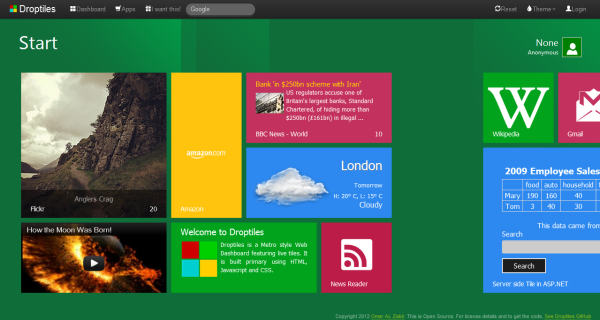Droptiles is an Open Source Windows 8 Start like Metro style Web 2.0 Dashboard. It builds the experience using Tiles. Tiles are mini apps that can fetch data from external sources. Clicking on a tile launches the full app. Apps can be from any existing website to customized website specifically built to fit the Dashboard experience.
Droptiles is built almost entirely of HTML, Javascript and CSS and thus highly portable to any platform. The sample project is built using ASP.NET to show some server side integration, like Signup, Login and getting dynamic data from server. But with very little change you can port it to PHP, Ruby, JSP or any other platform.
Droptiles is the sequel of my Dropthings, which is the first Open Source Web 2.0 Dashboard.
See it live!, go to Droptiles.com, for Technical Documentation, read the Codeproject article.
- Metro style user interface. CSS framework to build metro style websites, inspired by metroui.org.ua.
- Drag & Drop tiles to personalize the experience.
- Live tiles: Tiles are mini-apps, loading data from variety of sources.
- Quick and easy App framework. Try the Flickr and News Reader app.
- Client side object model and data binding for easy MVVM implementation.
- Server side platform neutral implementation. Can be ported to PHP, JSP easily.
It even has its own App Store!
- As an Enterprise Dashboard
- Operational Dashboard
- Intranet Content Aggregator
- Employee Portal
- Web 2.0 Portal offering portlets in the form of tiles. Aggregating data from various services and as a launch pad for different services.
- Touch enabled Kiosk front-end.
- Content aggregator for News and Research purpose.
I am Omar AL Zabir, the Chief Architect of SaaS Platform, BT (aka British Telecom). Microsoft MVP on ASP.NET/IIS. Ex Co-Founder and CTO of the first Web 2.0 Social Start Page - Pageflakes, owner of popular open source projects - Dropthings, Codeuml.com.
Follow me on my blog for future updates.
Droptiles is Open Source. It is free for personal use as long as you keep the copyright notices intact. In order to buy license, go to the Droptiles production site and there's a tile on the right side to place the order through Paypal.
Email me for any query: omaralzabir at gmail dot com.
- jQuery for all client side effects.
- KnockoutJS for client side Object Model and data binding.
- UnderscoreJS.
- Bootstrap for cross-browser CSS framework and jQuery plugins.
AppStore offers new applications
Tiles are mini apps that can have their own html, javascript and css. They are loaded by the Dashboard dynamically and executed dynamically. Each tile runs on its own delivering the in-tile experience. There's no special Widget framework to follow. Just plain simple Javascript.
Tiles can be dynamic pages delivered from the server. Here is a tile that captures the html output of an ASPX page. Tiles can be intercative as well. You can embed a form inside a tile.
External applications can run inside Droptiles offering a seamless integration experience.
HTML Apps using Droptiles css and js framework.
- Droptiles has 100+ hours of my effort and 200+ hours of community effort to get it where it is now. If you try to build it from scratch, by the time you get to production quality, you would probably have spent more money than just buying commercial license for the code.
- Droptiles has a highly readable, extensible, maintainable codebase.
- Droptiles is a minimalistic framework to build apps on top of it. It’s not a full blown CMS, which you need to spend months learning in order to customize it. The codebase is small, and highly reusable – making it very easy to build bespoke sites on top of it.
- Droptiles will force your developers to use industry best practices. For instance, using MVVM architecture, building sites on top of cross-browser CSS and JS frameworks, pluggable architecture where features are dynamically loaded and so on.
- Droptiles is built specifically to be integrated with existing ASP.NET/PHP/JSP/Ruby web applications, where most other CMS are built to be run as a standalone app.
Please go over to the Wiki for detail project documentation.







